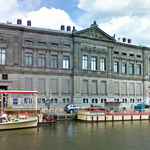Amsterdam Symposium on the History of Food
- Start date
- 5 June 2025
- End date
- 6 June 2025
- Time
- 10:00
- Location
- Allard Pierson
Cities have played a central role in the history of food. Their impact on the organization of food systems, the rise of modern food technologies, and the emergence of new food cultures and identities has been so profound that some scholars have declared it difficult to “separate urban food history from food history tout court.” The growth of cities, towns, and other dense settlements, in turn, has been shaped decisively by geographies of food production and consumption within and across city borders. Food trade, imperialism, and migration have expanded metropoles’ transportation networks, sensory landscapes, and culinary infrastructures. Migrant marketplaces have forged new alignments of global food chains, conjuring new forms of customs, commerce and cuisine.
The Allard Pierson is the museum and knowledge institute for the heritage collections of the University of Amsterdam.
It is one of the UvA podia in the University Quarter.

